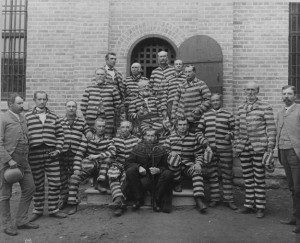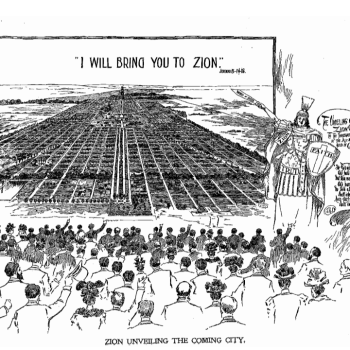One would think that with the half-decade “Mormon moment” now well past, Mormonism would now generate news only infrequently. That is not quite turning out to be the case. New missionary requirements, concerns about internet-driven apostasy, the recent statement on the priesthood ban, and now a Utah District Court decision that strikes down part (but only part) of a 1973 statute against polygamy and cohabitation.
First some background… Partly because of an ongoing threat of prosecution, the polygamous Brown family of Sister Wives fame sued the state of Utah. Kody Brown has four “wives,” though he is only legally married to one and has not sought to legally marry the other three. He does cohabit with all four wives and was sealed to the latter three in religious ceremonies. A 1973 Utah Statute (which replaced earlier laws on the subject) makes it illegal when a married person “purports to marry another person or cohabits with another person.”
Utah, like most states, has a very large number of married persons who “cohabit”: adulterers, persons separated from their spouses but not divorced, etc. The state makes no attempt to prosecute such individuals. Unlike most other states, Utah also has a sizeable number of people who practice religiously motivated polygamy. Most of these individuals have either current or former connections with the breakaway churches created after the Church of Jesus Christ of Latter-day Saints abandoned the practice of plural marriage. Utah generally also does not prosecute these cases unless it also has evidence of collateral crimes. However, the law is on the books and serves as an inducement for polygamists to keep a low profile. When Kody Brown and his wives did anything but keep a low profile, they found themselves threatened with prosecution. State counsel stated that “the Statute is not intended to capture mere adultery or adulterous cohabitation … but that it is illegal under the Statute to participate in a wedding ceremony between a legally married individual and a person with whom he or she is cohabiting and/or to call that person a wife.” This was key for the court’s ruling.
The court concluded that the statute targeted “Mormon fundamentalists” who practice polygamy out of their religious convictions, and it struck down the cohabitation part of the statute as a violation of the Free Exercise Clause and “as without a rational basis under the Due Process Clause.” Thus, it remains illegal in Utah to attempt to legally contract multiple marriages, but (pending a possible appeal), it is no longer illegal for an individual to marry multiple spouses in religious ceremonies, refer to them as such, and live with them. For some very good analysis of the case and the constitutional issues involved, see this piece by Nate Oman at Religion & Politics.
A few thoughts:
– It’s remarkable to read a court opinion that draws on so much recent scholarship on the history of nineteenth-century Mormonism. Scholars such as Richard Bushman, Kathleen Flake, Sarah B. Gordon, and many others feature prominently in the footnotes. The court did its homework.
– The ruling includes a rather tangential discussion of Joseph Smith’s “polyandry” (i.e., marrying women already married to other men). It’s not exactly germane to the case. For what it’s worth, though, the ruling incorrectly asserts that polyandry “was unknown outside of a few instances involving LDS Church founder Joseph Smith.” Brigham Young also married a goodly number of already married women.
– The ruling is occasionally eloquent and profound. I entirely agree that “it is perhaps a bitter irony of the history at issue here that it is possible to view the LDS Church as playing the role of both victim and violator in the saga of religious polygamy in Utah (and America).”
– The ruling absolutely trashes the 1879 Reynolds v. U.S. decision that upheld statutes obviously targeting Mormon polygamists, suggesting that the Supreme Court’s obvious prejudice against the Latter-day Saints cast tremendous doubt on its validity. Polygamy, the Court suggested in Reynolds, deserved extirpation because it “was almost exclusively a feature of the life of Asiatic and of African people.” As the Court ruled in an 1890 case involving the LDS Church, Mormon religious practices were “contrary to the spirit of Christianity.” Judge Waddoup’s summary on Reynolds: “the court believes that Reynolds is not, or should no longer be considered, good law, but also acknowledges its ambiguous status given its continued citation by both the Supreme Court and the Tenth Circuit as general historical support for the broad principle that a statute may incidentally burden a particular religious practice so long as it is a generally applicable, neutral law not arising from religious animus or targeted at a specific religious group or practice.”
– Free Exercise cases are tricky. In 1990 (in Employment Division v. Smith), the Court held that the State of Oregon could deny unemployment benefits to persons violating a state ban on the use of peyote, even if the use in question was for religious practices. Oregon was not targeting practitioners of native religions when it passed the law. By contrast, in 1993’s Church of the Lukumi Babalu Aye, Inc. v. Hialeah, the Court struck down a local Florida law that criminalized the killing of animals “in a public or private ritual or ceremony not for the primary purpose of food consumption.” The city had passed the law after it learned that a church associated with Santeria was planning to relocate within its boundaries. Thus, much hinges on whether or not a jurisdiction targets particular religious practices in a given statute. In the polygamy/cohabitation case, the district court held that Utah targeted “Mormon fundamentalists” by criminalizing plural cohabitation.
– Because of that last point, the decision seems solid to me. There’s no constitutional grounds for a state to criminalize or prosecute specifically religious forms of plural cohabitation. While the ruling leaves the strictly polygamy section of the statute intact, in its discussion of Reynolds, the ruling presumes that only bitter prejudice (technically, anti-religious but very akin to Orientalist-style racism) motivated the criminalization of Mormon polygamy and implies that only prejudice motivated the criminalization of fundamentalist polygamy in Utah. Evidently, the defendants in last week’s ruling failed to provide any “admissible evidence” that religious cohabitation leads to “social harms.” For those who suggest that this case opens the door for the legalization of polygamy itself, I suspect most judges will be open to the idea that more than mere religious prejudice lays behind the very long history of anti-polygamy laws (the ruling in question traces the history of such laws back around 1,500 years). Those who oppose polygamy, however, had better be prepared to argue the “social harms” point more effectively than the State of Utah apparently did in this case.
 – Just a few days after the decision (and presumably out of coincidence), the church released an updated “Gospel Topics” statement on “Plural Marriage and Families in Early Utah.” [I’m at all not convinced by the opening sentence, which claims that the Bible and the Book of Mormon both teach that monogamy is the general rule and polygamy a divinely mandated exception]. I find the statement noteworthy for its frank discussion of post-1890 plural marriages. In its general tone and approach, I find the statement surprisingly positive for its argument that regardless of the personal pain and sacrifice involved, “the faithfulness of those who practiced plural marriage continues to benefit the Church in innumerable ways.” The contrast with the recent statement on race and the priesthood is sharp. Church members should have confidence that their early leaders and their ancestors followed a divine commandment (even if the reasons for it remain difficult to understand) perhaps well suited for the circumstances of the nineteenth-century frontier. And given Judge Waddoup’s thrashing of the Reynolds decision, today’s Latter-day Saints have even more reason to commemorate their ancestors for enduring what by contemporary standards was an unconstitutional assault on their religion and sexuality.
– Just a few days after the decision (and presumably out of coincidence), the church released an updated “Gospel Topics” statement on “Plural Marriage and Families in Early Utah.” [I’m at all not convinced by the opening sentence, which claims that the Bible and the Book of Mormon both teach that monogamy is the general rule and polygamy a divinely mandated exception]. I find the statement noteworthy for its frank discussion of post-1890 plural marriages. In its general tone and approach, I find the statement surprisingly positive for its argument that regardless of the personal pain and sacrifice involved, “the faithfulness of those who practiced plural marriage continues to benefit the Church in innumerable ways.” The contrast with the recent statement on race and the priesthood is sharp. Church members should have confidence that their early leaders and their ancestors followed a divine commandment (even if the reasons for it remain difficult to understand) perhaps well suited for the circumstances of the nineteenth-century frontier. And given Judge Waddoup’s thrashing of the Reynolds decision, today’s Latter-day Saints have even more reason to commemorate their ancestors for enduring what by contemporary standards was an unconstitutional assault on their religion and sexuality.












